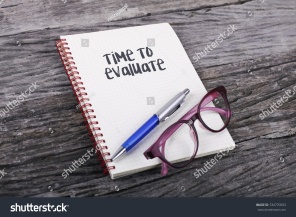 The new conceptualisation of mediation discussed in the previous post, inclusive of diverse practice, responsive, relational and ethically focused on the achievement of party self-determination in specific party contexts, will require ongoing evaluation and measurement of the extent to which the system does or does not live up to this recalibrated identity. Evaluation and measurement, both in absolute terms, and in comparison with other practices, will be critical for mediation’s future legitimacy and credibility, as it has been to the establishment of mediation’s current standing and acceptability in legal and social contexts.
The new conceptualisation of mediation discussed in the previous post, inclusive of diverse practice, responsive, relational and ethically focused on the achievement of party self-determination in specific party contexts, will require ongoing evaluation and measurement of the extent to which the system does or does not live up to this recalibrated identity. Evaluation and measurement, both in absolute terms, and in comparison with other practices, will be critical for mediation’s future legitimacy and credibility, as it has been to the establishment of mediation’s current standing and acceptability in legal and social contexts.
However, the methods and approaches to how we evaluate mediation into the future will need to move past approaches with historical emphases on documenting settlement rates and satisfying statistical masters on time and resource factors. The profundity of methods for assessing mediation to date have been hampered by confidentiality, and by the confirmation bias associated with the need to establish mediation’s effectiveness and efficiency. Continued research is important into the future but will need to be more rigorous and sophisticated — to gauge the value of mediation in general as well as the efficacy of specific skills and interventions from the KSAE (the knowledge, skills, attitudes and ethics discussed previously).
More nuanced qualitative and interdisciplinary methodologies that explain the phenomenon of mediation more effectively will be necessary, such as narrative and phenomenographical methods, including approaches such as observation-based case studies, clinical reflective mediator practice, and individual anecdotes of existential experiences revealed through interviews and focus groups. Research design will include more variables and evaluation systems being built into the foundations of mediation programs to ensure more systematic collection of hard data and soft perceptions. Researchers and policy-makers will interrogate the problem of ‘what do we need to know about mediation’ more closely in order to design appropriate methods to extract the most useful and valid data. Researchers will also need to overcome confidentiality issues, look more critically at the quality of parties’ experiences, expose the shortcomings of mediation, evidence its diverse benefits and question the sustainability and justice of outcomes. Increased rigour in the measurement and evaluation of mediation and its bundle of attributes will better assist theory to meet practice and better inform policy development and the further institutionalisation of mediation.
In particular, we suggest that a closer evaluative eye is required on the operation of evaluative mediation, and the ability of evaluative mediators to achieve party self-determination ethically. It will be necessary to use research to ensure that if evaluative mediation becomes the normative approach, as well it might, that quality control and ethical frameworks exist to prevent rogue mediators making de facto determinations.
‘Forever learning’ is the potential mission statement of the mediation community into the future, as there is still much to be measured in, and understood about, mediation practice. Limitations in the ‘search for mediation knowledge’ will need to be overcome, and a deeper understanding of mediation practice will need to be revealed through a greater array of approaches and sources. Research efforts of greater depth and rigour will inform the future development of mediation’s bundle of attributes and micro-skills, as well as contribute to stronger awareness of the various pressures influencing and impacting the system. Understanding mediation is a long-term project for the mediation movement. Ultimately this understanding will contribute to mediation connecting more closely with the legal, social, economic and political contexts referred to in our previous posts.

We welcome your comments and responses to these thoughts.
Laurence Boulle and Rachael Field

Excellent points are made in this short piece which are equally applicable to a more general consideration and understanding of the rule of law within society and the meaning and role of “justice”.
The embrace of evaluative mediation is connected with a neoliberal conceptualisation if the unacceptable “cost” of justice which appropriates and misapplies the maxim “justice delayed is justice denied” to support and justify speed and determination over “justice”. The ending of controversy by the most readily available, most expeditious and cheapest means is to be preferred as against self dermination, genuine engagement and involvement or just outcome. As a consequence notions of procedural fairness and perceptions of justice are replaced with the mantra “quick and cheap”.
The vigilance and consideration of research might apply more broadly to all address of controversy within society. The move to quick and cheap results in an abandonment of thorough and just and impacts beyond individual disputes and disputants. The role of the common law is eroded when the principles applied in individual descisons are not only influenced by but based in economically expedient compromise and procedural “short cuts”. The most important aspect of dispute resolution is justice not expedition and especially not when timeliness (dealing with a dispute within a time and using the time necessary to do justice) is conflated with and abandoned to “quick”.
I hope this piece is the starting point for an ongoing discussion of the meaning of justice and the role of different modalities of dispute resolution in quelling controversy and resolving disputes.
LikeLiked by 1 person
Thank you Judge. It’s very encouraging to have your positive response to these thoughts, and to hear your thoughts about taking this forward. perhaps we could propose a panel for the NMC next year?
LikeLiked by 1 person
Future of mediation challenges articulated so well in this post
Well done Rachael and Laurence
LikeLike
The NSW Rural Assistance Authority assesses whether the mediation was “satisfactory” as defined in the Act after considering the mediator’s summary of the mediation (attached to the agreement to mediate), exit questionnaires and parties’ submissions if an application is made for an exemption certificate under the Act. The Authority provides mediation resources to the parties to help them prepare for an effective mediation. For further information contact Farm Debt Mediation Unit 02 63913013 e: hanna.jaireth@raa.nsw.gov.au
LikeLike
I agree. Particularly if we as we move into more sophisticated triage processes that identify the needs of both the client and the dispute itself.
LikeLike